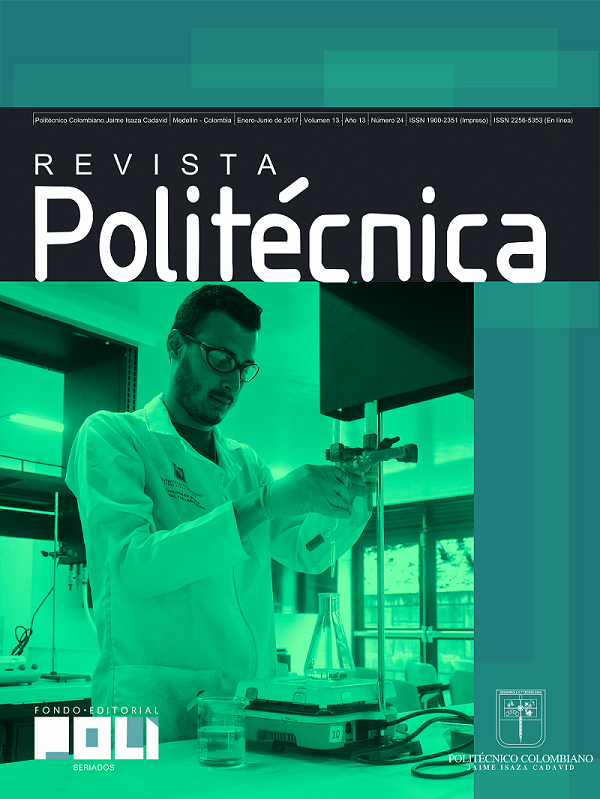Diffuse and pid controllers for a thermal process with wireless supervision using android and arduino
Keywords:
Arduino, Peltier cell, fuzzy controller, PID controller, PWMAbstract
In the process of water purification for human consumption, the control of the temperature contributes to its health and hygiene. The goal of this study was to compare the performance of a traditional controller with a fuzzy controller for this case study. The control strategies were designed and simulated in Matlab® software, and they were implemented in Atmega microcontroller of Arduino; in both cases, simulation and empirical setup, we considered the settling time, overshoot and steady state error to compare the controllers. The fuzzy controller eliminated the overshoot and reduced the settling time by 76 % in simulation, in comparison to the PID controller. In the experimental data, the fuzzy controller did not show overshoot and decreased the settling time by 28 % with respect to the other controller. The steady state error was zero in both controllers for simulation and for the empirical setup. The fuzzy controller was faster and more stable, for this reason, we concluded that this control strategy is appropriate to regulate the temperature in this process.
Article Metrics
Abstract: 1353 HTML (Español (España)): 2463 PDF (Español (España)): 1378 XML (Español (España)): 51References
Wang, H., Zhu, Y. y Hu, C. Impacts of bacteria and corrosion on removal of natural organic matter and disinfection byproducts in different drinking water distribution systems. International Biodeterioration & Biodegradation, 117, 52-59, 2017.
Espitia H. E. y Soriano-Méndez, J. J. Diseño y simulación de un controlador difuso de temperatura empleando el concresor basado en relaciones booleanas, Tecnura, 16(32), 29–40, 2012.
Rairan-Antolines, J. D., Guerrero-Cifuentes, C. E. y Mateus-Pineda, J. A., Diseño de controladores de tipo proporcional integral derivativo (PID) y difuso para la posición de un motor de corriente continua (DC), Ingeniería y Universidad, 14(1), 137–160, 2010.
Ferreyra, A. y Fuentes, R. Estudio comparativo entre control PID y difuso. Memorias, XV Congreso Nacional de Instrumentación. Ciudad de México, México, 1-6, 2012.
Abdullah, A. y Ayman, A. The advantages of PID fuzzy controllers over the conventional types. American Journal of Applied Sciences, 5(6), 653–658, 2008.
Amorin, H. S. y Dias, M. A. Sensores digitais de temperatura com tecnologia one-wire: Um exemplo de aplicação didática na área de condução térmica. Revista Brasileira de Ensino de Física, 37(4), 4310–1–4310–9, 2015.
Scharfglass, K. y Lehmer, A. Wireless sensor network for wine fermentation, California Polytechnic State University, Tech. Rep., 2012.
Vera-Romero, C. A., Barbosa-Jaimes, J. E. y Pabón-González, D. C. Acople de sensores en la medición de variables ambientales usando tecnología Zigbee. Scientia Et Technica, 19(4), 419–424, 2015.
Galván-Cruz, G. S. Control retroalimentado de un módulo termoeléctrico. Universidad Tecnológica de la Mixteca, Tech. Rep., 2012.
De-Moura, P. R. y Almeida, D. Refrigerador termoelétrico de Peltier usado para estabilisar um feixe laser em experimentos didáticos. Revista Brasileira de Ensino de Física, 36(1), 1–5, 2014.
Golnaraghi, F. y Kuo, B. C. Design of control systems. En: Automatic control systems, 9th Ed., Wiley, reading 664-835, 2010.
Ogata, K. PID Controllers and Modified PID Controllers. En: Sistemas de control automático, 5th Ed., Prentice Hall, Inc., reading 567-647, 2010.
Solaque-Guzmán, L., Cristancho-Cardozo, C. A. y Gil-Cárdenas, C. A. Diseño e implementación de una plataforma experimental de dos grados de libertad controlada por dos técnicas: PID y lógica difusa. Ciencia e Ingeniería Neogranadina, 24(1), 99–115, 2014.
Castillo, O. y Melin, P. A review on the design and optimization of interval type-2 fuzzy controllers. Applied Soft Computing, 12, 1267-1278, 2012.
Sa-ngawong, N. y Ngamroo, I. Intelligent photovoltaic farms for robust frequency stabilization inmulti-area interconnected power system based on PSO-based optimalSugeno fuzzy logic control. Renewable Energy, 74, 555-567, 2015.
Hermes, C.J. y Barbosa Jr, J. R. Thermodynamic comparison of Peltier, stirling, and vapor compression portable coolers. Applied Energy, 91(1), 51 – 58, 2012.
Paez-Moreno, J. J. y Rodríguez-López, J. E. Propiedades eléctricas y estructurales de compuestos cerámicos del tipo camno-y. Momento, 44, 22–34, 2012.
Leal, J. F., León, M. M. y Sepúlveda, S. B. El diodo Schottky como atenuador del efecto Seebeck en una celda Peltier para un control PID de temperatura. Entre Ciencia e Ingeniería, 9(18), 75–83, 2015.


 _
_


















